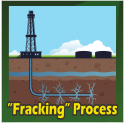Proposed Drilling on College Campuses, Not a New Concept
ASSOCIATED PRESS -- The reactions ranged from startled to silly. Was Gov. Tom Corbett serious when he said in April that state college campuses situated over the Marcellus shale could be opened to natural gas drilling?
Environmentalists conjured images of dirty, dangerous drill rigs sprawling across campus quadrangles. In newspaper website comment fields, readers asked, "Is he joking?"
An upstate legislator has already crafted a bill that would allow campus drilling. Preliminary talks with school officials have begun. And there is a model to work from: Oil and gas wells are nothing new on campuses and other public spaces out West.
Natural gas wells drilled in 2009 are generating millions in royalties for the University of Texas in Arlington. Multistory oil derricks sit just outside the front door of the state Capitol in Oklahoma City. Even Indiana University of Pennsylvania once powered its campus with natural gas from four wells.
Now Corbett, who wants to lift a moratorium on expanded gas drilling in state forests and open prison property to drilling, says the Marcellus shale natural gas reserve could be a boon to state-supported colleges.
In a speech near Erie to trustees from the 14 universities in the state system, Corbett said it was time to consider opening land to drilling on the six campuses within the shale reserve.
"I will tell you, we are looking at the prisons of Pennsylvania and the land that they have," he added.
Kenn Marshall, spokesman for the State System of Higher Education, said preliminary discussions had been taking place about using gas drilling to generate revenue for the system's universities. Four of those schools are directly atop the shale: Mansfield, Lock Haven, Indiana University of Pennsylvania, and California. Two others, Clarion and Slippery Rock, are on the edges of the reserve.
Because those colleges' lands are state-owned -- as are the mineral rights -- any income from such drilling would have to go into state coffers. That is, Marshall said, unless the law is changed to allow universities to keep gas royalties.
State Rep. Matt Baker, R-Tioga, whose district is in the heart of the Marcellus shale drilling region, has introduced a bill that would permit the schools to retain 60 percent of the gas royalties, with the rest going to state-system universities that didn't host well sites. The proposal says schools could use the money to pay for capital projects and to improve energy efficiency.
Some academics and environmentalists promptly condemned the idea. Robert Myers, director of environmental studies and a professor of English at Lock Haven University, said he had been thoroughly disgusted when he heard of Corbett's comments.
"It suggests how detached from reality he is," said Myers, who supports a moratorium on drilling. "The thought of exposing our students to an industry with such a long record of accidents is appalling."
No Pennsylvania State University land, either at its University Park campus or branches, is within the exploration area for the shale, a spokeswoman said.
To read the original article published on GoErie.com, Click Here.






